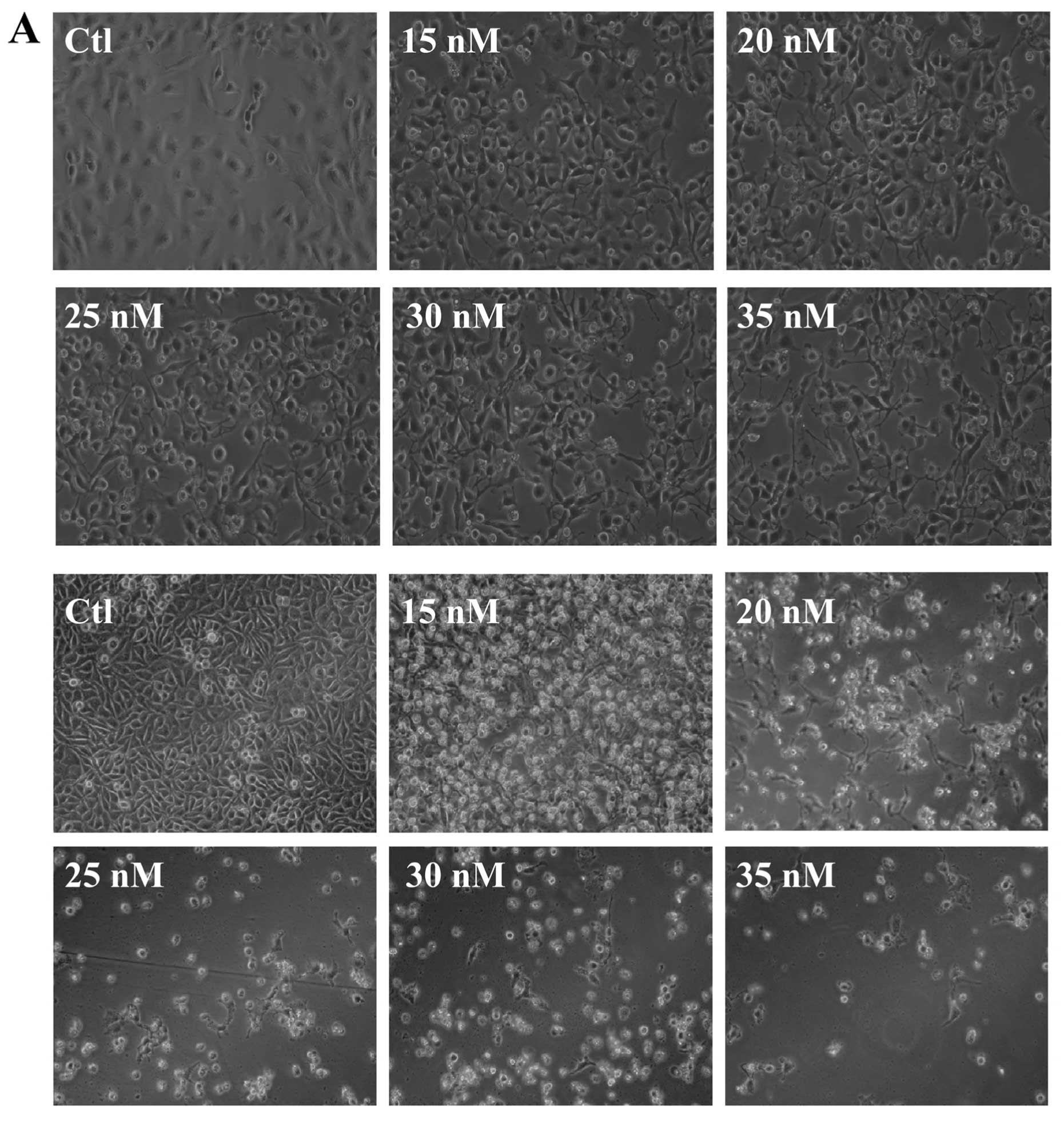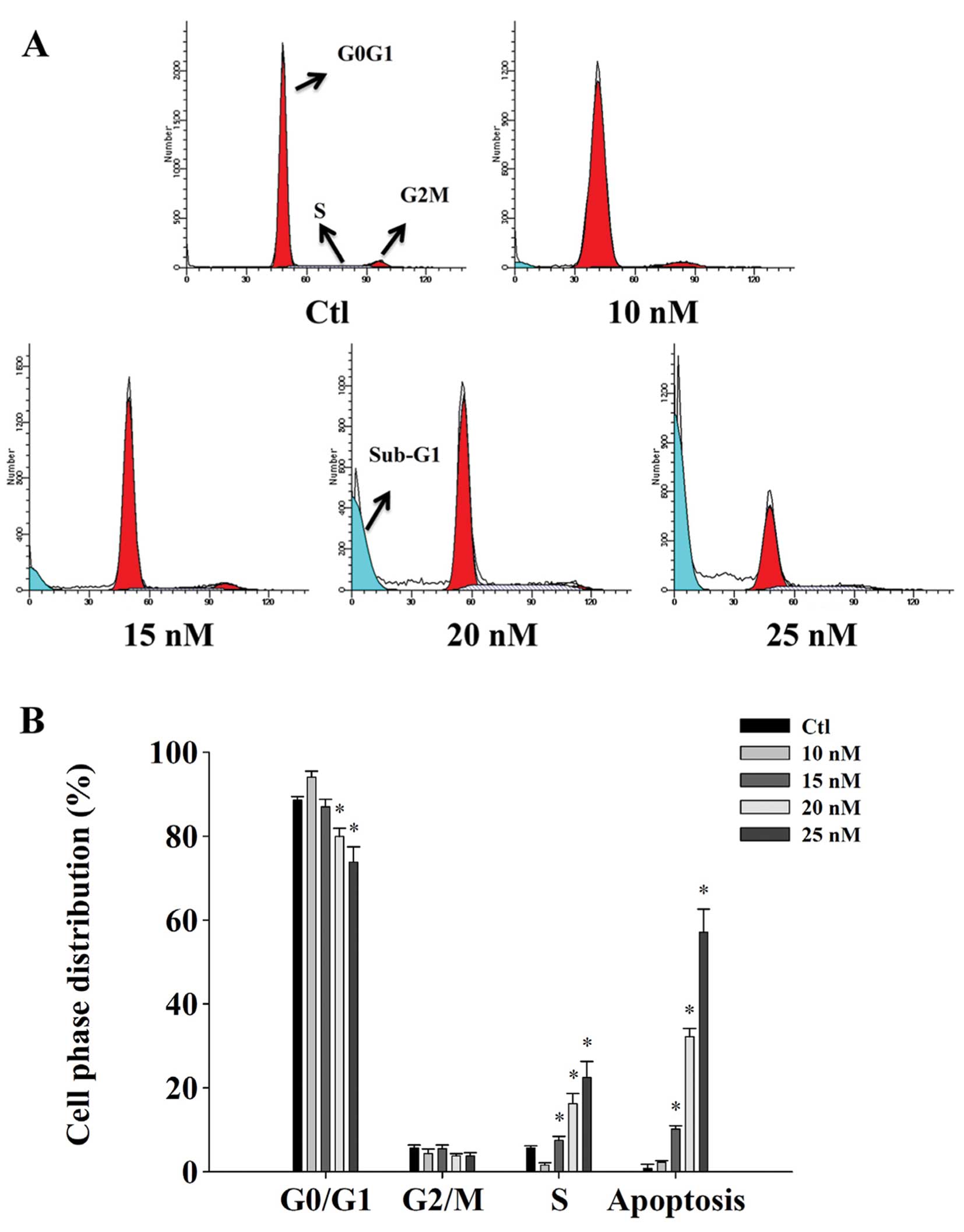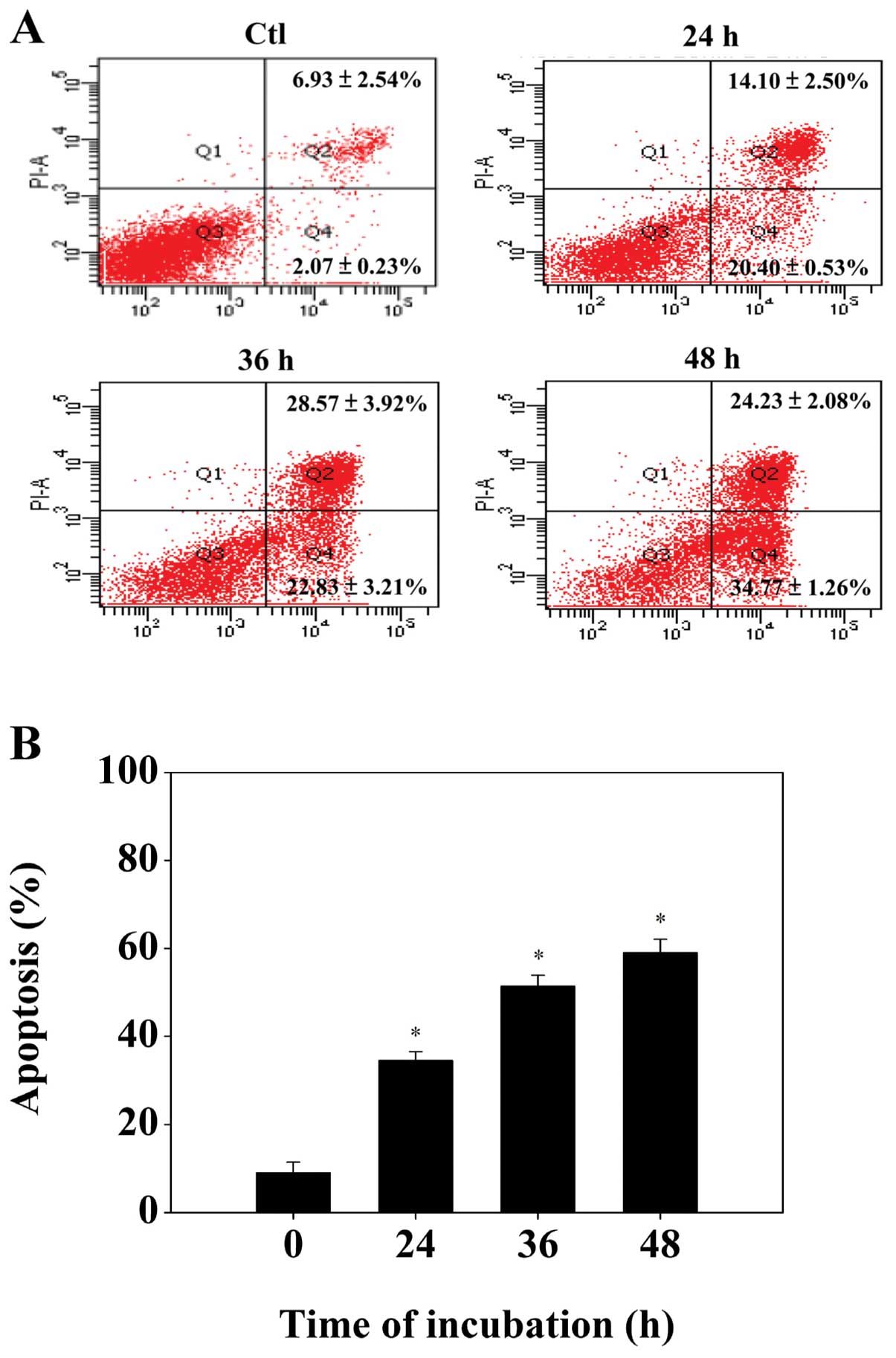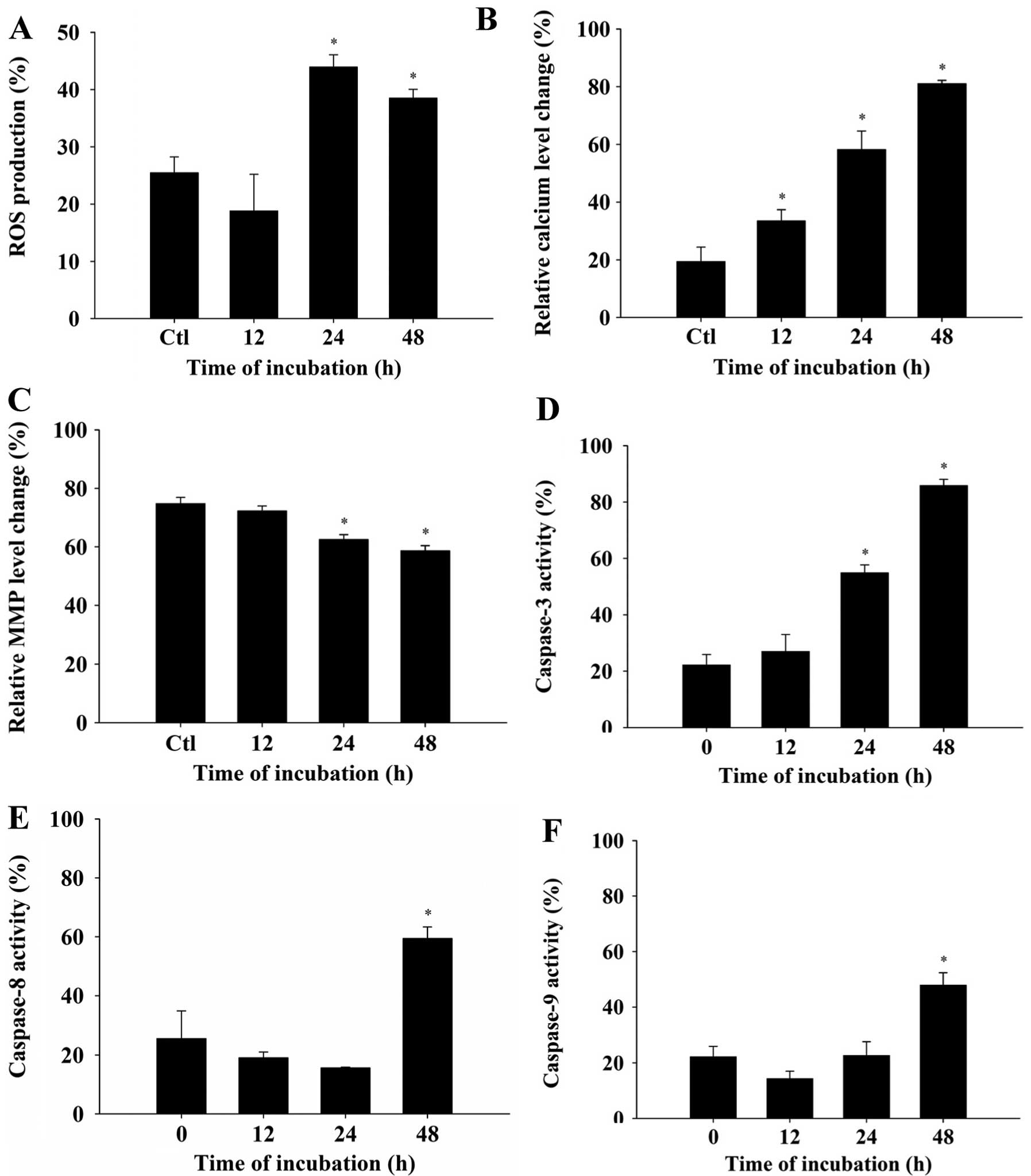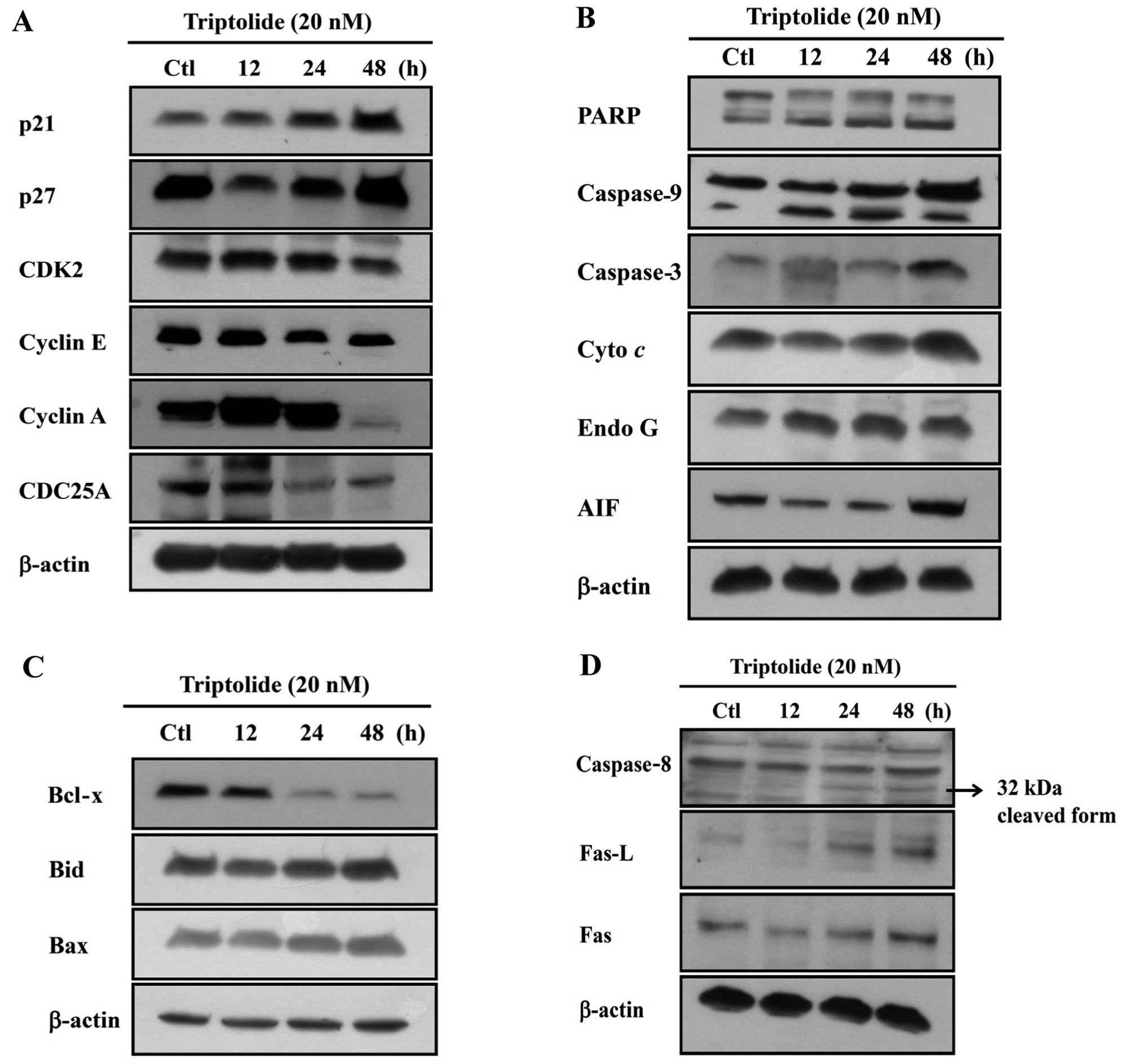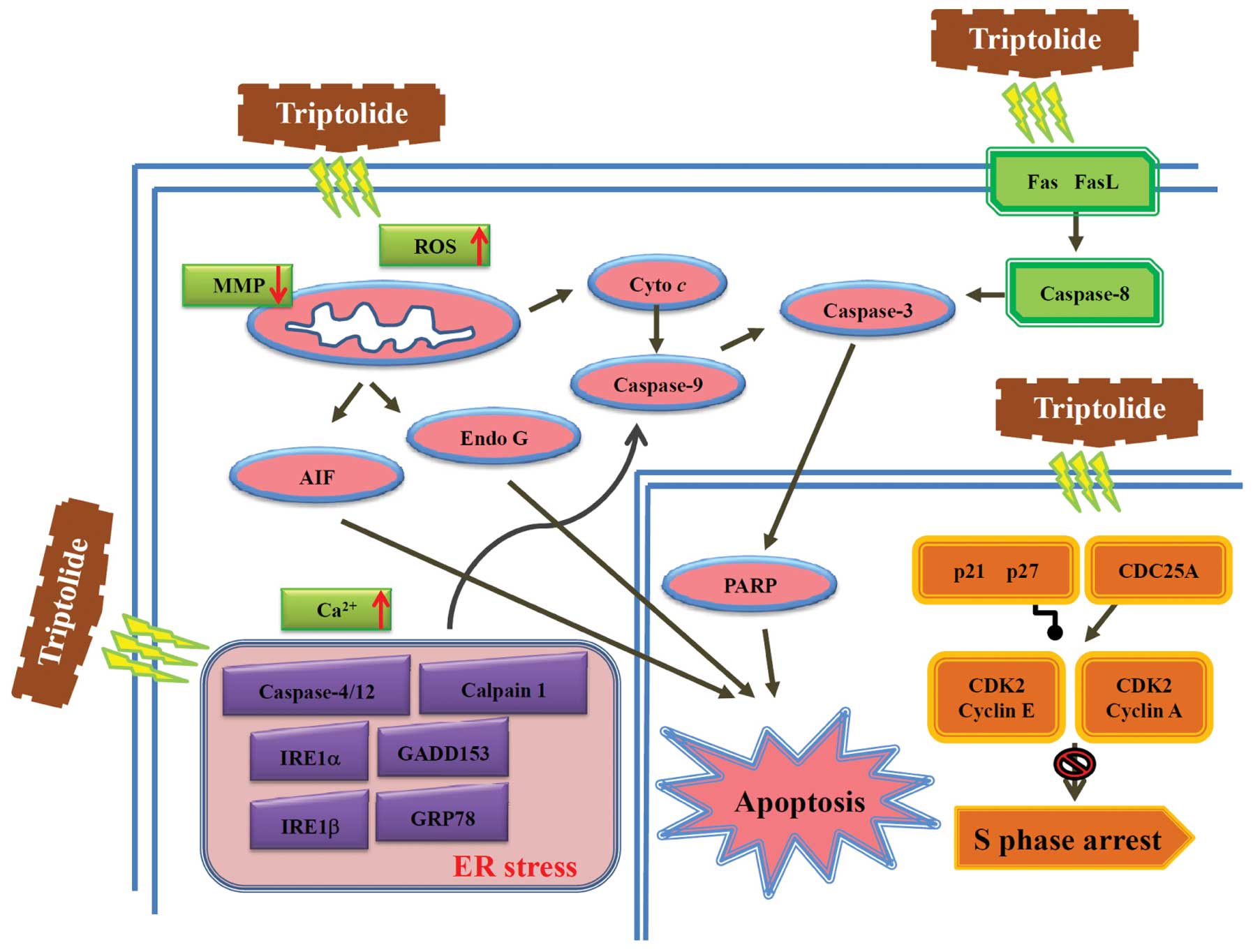|
1
|
Freedman DM, Dosemeci M and McGlynn K:
Sunlight and mortality from breast, ovarian, colon, prostate, and
non-melanoma skin cancer: a composite death certificate based
case-control study. Occup Environ Med. 59:257–262. 2002. View Article : Google Scholar : PubMed/NCBI
|
|
2
|
Rodriguez-Villanueva J and McDonnell TJ:
Induction of apoptotic cell death in non-melanoma skin cancer by
interferon-alpha. Int J Cancer. 61:110–114. 1995. View Article : Google Scholar : PubMed/NCBI
|
|
3
|
Cromwell KD, Ross MI, Xing Y, et al:
Variability in melanoma post-treatment surveillance practices by
country and physician specialty: a systematic review. Melanoma Res.
22:376–385. 2012. View Article : Google Scholar : PubMed/NCBI
|
|
4
|
Ascierto PA, Gogas HJ, Grob JJ, et al:
Adjuvant interferon alfa in malignant melanoma: An
interdisciplinary and multinational expert review. Crit Rev Oncol
Hematol. Aug 5–2012.(Epub ahead of print).
|
|
5
|
Chen GG and Lai PB: Role of apoptosis in
chemotherapy. Curr Drug Targets. 11:650–651. 2010.PubMed/NCBI
|
|
6
|
Guerriero JL, Ditsworth D, Fan Y, Zhao F,
Crawford HC and Zong WX: Chemotherapy induces tumor clearance
independent of apoptosis. Cancer Res. 68:9595–9600. 2008.
View Article : Google Scholar : PubMed/NCBI
|
|
7
|
Oberoi-Khanuja TK, Karreman C, Larisch S,
Rapp UR and Rajalingam K: Role of melanoma inhibitor of apoptosis
(ML-IAP) protein, a member of the baculoviral IAP repeat (BIR)
domain family, in the regulation of C-RAF kinase and cell
migration. J Biol Chem. 287:28445–28455. 2012. View Article : Google Scholar : PubMed/NCBI
|
|
8
|
Günther C, Neumann H, Neurath MF and
Becker C: Apoptosis, necrosis and necroptosis: cell death
regulation in the intestinal epithelium. Gut. Jun 27–2012.(Epub
ahead of print).
|
|
9
|
Liu Y, Chen Y, Lamb JR and Tam PK:
Triptolide, a component of Chinese herbal medicine, modulates the
functional phenotype of dendritic cells. Transplantation.
84:1517–1526. 2007. View Article : Google Scholar : PubMed/NCBI
|
|
10
|
Leuenroth SJ, Okuhara D, Shotwell JD, et
al: Triptolide is a traditional Chinese medicine-derived inhibitor
of polycystic kidney disease. Proc Natl Acad Sci USA.
104:4389–4394. 2007. View Article : Google Scholar : PubMed/NCBI
|
|
11
|
Tan BJ, Tan BH and Chiu GN: Effect of
triptolide on focal adhesion kinase and survival in MCF-7 breast
cancer cells. Oncol Rep. 26:1315–1321. 2011.PubMed/NCBI
|
|
12
|
Messina ME Jr and Halaby R: Does
triptolide induce lysosomal-mediated apoptosis in human breast
cancer cells? Med Hypotheses. 77:91–93. 2011. View Article : Google Scholar : PubMed/NCBI
|
|
13
|
Lee KY, Park JS, Jee YK and Rosen GD:
Triptolide sensitizes lung cancer cells to TNF-related
apoptosis-inducing ligand (TRAIL)-induced apoptosis by inhibition
of NF-kappaB activation. Exp Mol Med. 34:462–468. 2002. View Article : Google Scholar : PubMed/NCBI
|
|
14
|
Zhu W, Li J, Wu S, et al: Triptolide
cooperates with Cisplatin to induce apoptosis in
gemcitabine-resistant pancreatic cancer. Pancreas. 41:1029–1038.
2012. View Article : Google Scholar : PubMed/NCBI
|
|
15
|
Wang W, Li X, Sun W, et al: Triptolide
triggers the apoptosis of pancreatic cancer cells via the
downregulation of Decoy receptor 3 expression. J Cancer Res Clin
Oncol. 138:1597–1605. 2012. View Article : Google Scholar : PubMed/NCBI
|
|
16
|
Liu Y, Song F, Wu WK, et al: Triptolide
inhibits colon cancer cell proliferation and induces cleavage and
translocation of 14-3-3 epsilon. Cell Biochem Funct. 30:271–278.
2012. View
Article : Google Scholar : PubMed/NCBI
|
|
17
|
Liu J, Shen M, Yue Z, et al: Triptolide
inhibits colon-rectal cancer cells proliferation by induction of G1
phase arrest through upregulation of p21. Phytomedicine.
19:756–762. 2012. View Article : Google Scholar : PubMed/NCBI
|
|
18
|
Shi X, Jin Y, Cheng C, et al: Triptolide
inhibits Bcr-Abl transcription and induces apoptosis in
STI571-resistant chronic myelogenous leukemia cells harboring T315I
mutation. Clin Cancer Res. 15:1686–1697. 2009. View Article : Google Scholar : PubMed/NCBI
|
|
19
|
Pigneux A, Mahon FX, Uhalde M, et al:
Triptolide cooperates with chemotherapy to induce apoptosis in
acute myeloid leukemia cells. Exp Hematol. 36:1648–1659. 2008.
View Article : Google Scholar : PubMed/NCBI
|
|
20
|
Yao GH, Luan JF, Ye D, et al: Effects of
triptolide on proliferation and apoptosis of Jurkat cell line in
acute T lymphocytic leukemia. Zhongguo Shi Yan Xue Ye Xue Za Zhi.
16:506–509. 2008.(In Chinese).
|
|
21
|
Wu PP, Liu KC, Huang WW, et al: Triptolide
induces apoptosis in human adrenal cancer NCI-H295 cells through a
mitochondrial-dependent pathway. Oncol Rep. 25:551–557.
2011.PubMed/NCBI
|
|
22
|
Hsiao YP, Yu CS, Yu CC, et al: Triggering
apoptotic death of human malignant melanoma a375.s2 cells by
bufalin: involvement of caspase cascade-dependent and independent
mitochondrial signaling pathways. Evid Based Complement Alternat
Med. 2012:5912412012. View Article : Google Scholar
|
|
23
|
Huang SH, Wu LW, Huang AC, et al: Benzyl
isothiocyanate (BITC) induces G2/M phase arrest and apoptosis in
human melanoma A375.S2 cells through reactive oxygen species (ROS)
and both mitochondria-dependent and death receptor-mediated
multiple signaling pathways. J Agric Food Chem. 60:665–675. 2012.
View Article : Google Scholar
|
|
24
|
Lu CC, Yang JS, Chiang JH, et al: Novel
quinazolinone MJ-29 triggers endoplasmic reticulum stress and
intrinsic apoptosis in murine leukemia WEHI-3 cells and inhibits
leukemic mice. PLoS One. 7:e368312012. View Article : Google Scholar : PubMed/NCBI
|
|
25
|
Huang WW, Yang JS, Lin MW, et al:
Cucurbitacin E induces G(2)/M phase arrest through STAT3/p53/p21
signaling and provokes apoptosis via Fas/CD95 and
mitochondria-dependent pathways in human bladder cancer T24 cells.
Evid Based Complement Alternat Med. 2012:9527622012. View Article : Google Scholar : PubMed/NCBI
|
|
26
|
Yang JS, Hour MJ, Huang WW, Lin KL, Kuo SC
and Chung JG: MJ-29 inhibits tubulin polymerization, induces
mitotic arrest, and triggers apoptosis via cyclin-dependent kinase
1-mediated Bcl-2 phosphorylation in human leukemia U937 cells. J
Pharmacol Exp Ther. 334:477–488. 2010. View Article : Google Scholar
|
|
27
|
Nowak M, Strzelczyk A, Reif PS, et al:
Minocycline as potent anticonvulsant in a patient with astrocytoma
and drug resistant epilepsy. Seizure. 21:227–228. 2012. View Article : Google Scholar : PubMed/NCBI
|
|
28
|
Fidler IJ: The role of the organ
microenvironment in brain metastasis. Semin Cancer Biol.
21:107–112. 2011. View Article : Google Scholar : PubMed/NCBI
|
|
29
|
Eichhorn T and Efferth T: P-glycoprotein
and its inhibition in tumors by phytochemicals derived from Chinese
herbs. J Ethnopharmacol. 141:557–570. 2012. View Article : Google Scholar : PubMed/NCBI
|
|
30
|
Schneekloth JS Jr and Crews CM: Natural
product inhibitors of the ubiquitin-proteasome pathway. Curr Drug
Targets. 12:1581–1594. 2011. View Article : Google Scholar : PubMed/NCBI
|
|
31
|
Zhao H, Yang Z, Wang X, et al: Triptolide
inhibits ovarian cancer cells invasion by repression of MMP7, MMP19
and upregulation of E-cadherin. Exp Mol Med. Aug 20–2012.(Epub
ahead of print).
|
|
32
|
Wang Y, Lu JJ, He L and Yu Q: Triptolide
(TPL) inhibits global transcription by inducing
proteasome-dependent degradation of RNA polymerase II (Pol II).
PLoS One. 6:e239932011. View Article : Google Scholar : PubMed/NCBI
|
|
33
|
Yang SW, Wang W, Xie XY, Zhu WP and Li FQ:
In vitro synergistic cytotoxic effect of triptolide combined with
hydroxycamptothecin on pancreatic cancer cells. Am J Chin Med.
39:121–134. 2011. View Article : Google Scholar : PubMed/NCBI
|
|
34
|
Mujumdar N, Mackenzie TN, Dudeja V, et al:
Triptolide induces cell death in pancreatic cancer cells by
apoptotic and autophagic pathways. Gastroenterology. 139:598–608.
2010. View Article : Google Scholar : PubMed/NCBI
|
|
35
|
Chernigovskaia EV, Iamova LA, Atochin D,
Huang P and Glazova MV: Interaction of neuronal NOS and
catecholamines in regulation of expression of proteins of apoptosis
by vasopressinergic hypothalamic neurons. Zh Evol Biokhim Fiziol.
47:232–238. 2011.(In Russian).
|
|
36
|
Chen YW, Lin GJ, Chia WT, Lin CK, Chuang
YP and Sytwu HK: Triptolide exerts anti-tumor effect on oral cancer
and KB cells in vitro and in vivo. Oral Oncol. 45:562–568. 2009.
View Article : Google Scholar : PubMed/NCBI
|
|
37
|
Yang M, Huang J, Pan HZ and Jin J:
Triptolide overcomes dexamethasone resistance and enhanced
PS-341-induced apoptosis via PI3k/Akt/NF-κB pathways in human
multiple myeloma cells. Int J Mol Med. 22:489–496. 2008.PubMed/NCBI
|
|
38
|
Li W, Liu Y, Li XX, et al: MAPKs are not
involved in triptolide-induced cell growth inhibition and apoptosis
in prostate cancer cell lines with different p53 status. Planta
Med. 77:27–31. 2011. View Article : Google Scholar : PubMed/NCBI
|
|
39
|
Ferrandiz N, Caraballo JM,
Garcia-Gutierrez L, et al: p21 as a transcriptional co-repressor of
S-phase and mitotic control genes. PLoS One. 7:e377592012.
View Article : Google Scholar : PubMed/NCBI
|
|
40
|
Mauro M, Rego MA, Boisvert RA, et al: p21
promotes error-free replication-coupled DNA double-strand break
repair. Nucleic Acids Res. 40:8348–8360. 2012. View Article : Google Scholar : PubMed/NCBI
|















